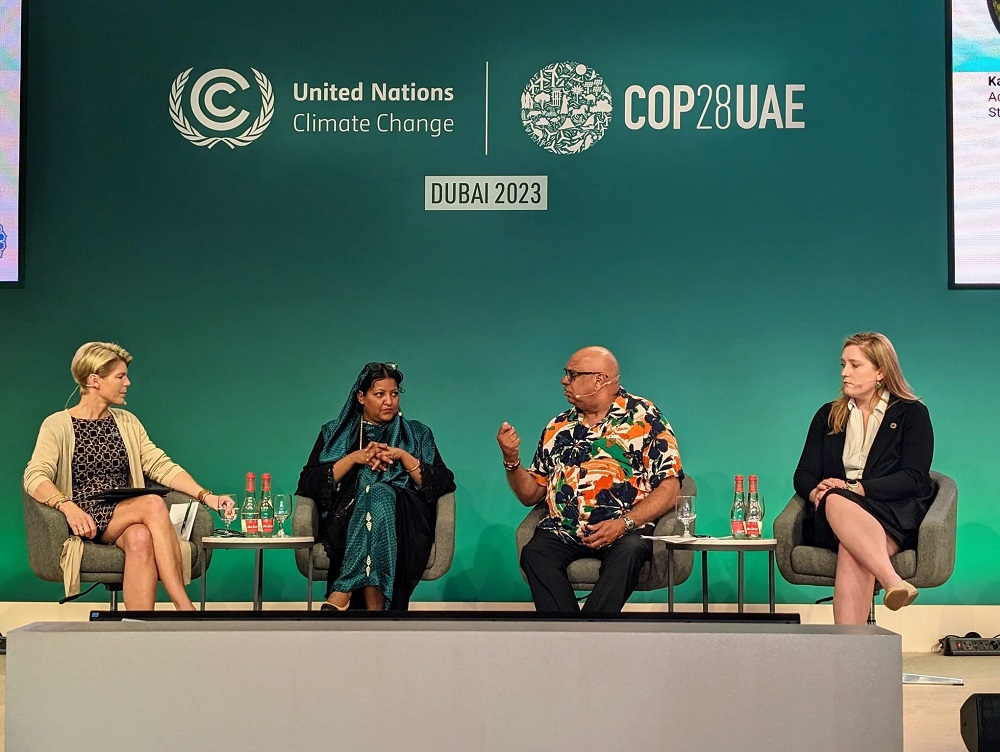Reshma Jayesh
15 December 2023: The University of Canberra is proud to share that our inaugural Galambany Professorial Fellow, Leslie ‘Phil’ Duncan, a proud Kamilaroi man, represented the University’s Centre for Applied Water Science (CAWS) at the 2023 United Nations Climate Change Conference (COP 28), in Dubai, United Arab Emirates.
During the Conference, Mr Duncan provided an Indigenous perspective across a range of important subjects including managing and caring for our freshwater resources, advocating for gender diverse voices with a focus on women, and served as a panel member in several Indigenous knowledge workshops. He demonstrated how cultural knowledge fits in with climate change.
Mr Duncan delivered a presentation on Freshwater Challenge (FWC) – a country-led initiative that aims to support, integrate and accelerate the restoration of 300,000 kilometres of degraded rivers and 350 million hectares of degraded wetlands by 2030, and conserve freshwater ecosystems. Since Australia is currently not a member of the FWC, Mr Duncan shared his perspective through an academic and cultural lens.
The COP28 Presidency, Dr. Sultan Ahmed Al Jaber, and more than 20 leaders representing various countries were in attendance, making Mr Duncan the first Indigenous person to give a talk addressing the Presidency.
At COP28, Mr Duncan also offered insights into how First Nations people in Australia have sustainably managed their lands, waters, seas and natural resources for the health of the Countries and peoples, and how their ecological knowledge transcends from one generation to the other and continues to stay relevant. He emphasised how dispossession and mismanagement of water can be detrimental to the environment and the people.
“We must stop approaching climate resilience by doing things for communities – especially Indigenous Communities - no matter how well intentioned. It is only when we start doing things with communities that we will walk into a sustainable future together. And that starts with listening,” he said while referring to freshwater as ‘the beating heart of Country’ and emphasising his belief that cultural science and western science can coexist.
“They validate one another and create options – harder options, softer options, cultural options,” Mr Duncan said.
Mr Duncan called for water management to be central to climate discussions moving forward – whether they involve tackling climate change issues more broadly or understanding the impact of water management on people and country.
In addition, Mr Duncan also called for women to be central to freshwater management discussions. “We need to ensure that there is always balance and equity not only in access to participation in the dialogue, but also equity in access in being involved in the co-designing of the initiatives we come up with together,” he said.

Other discussions that Mr Duncan actively contributed to included ‘From sea to source: Stories of climate adaptation and resilience connected by water’ – a reverse engineered perspective that offered practical and visual modelling presented by Water for Women and the Australian Water Partnership; the Marrakech Partnership for Global Climate Action; and many more.
Mr Duncan’s contribution to COP28 brought the University of Canberra’s expertise on water management and climate change onto the world stage, and unlocked new opportunities to action change.


